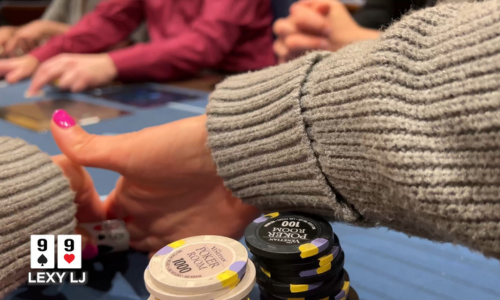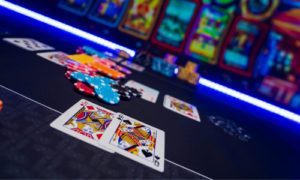
Hi friends, thanks for checking in again. This week, I’ve put together a few strategy tips you can apply to your game, some updates from the Poker world, and a look at what’s been going on in my own schedule lately. Whether you’re here to learn, stay sharp, or just keep up with the game, I appreciate you being part of this community. Let’s dive in.
This Week’s Insights
- What’s New in Poker?
- Poker Tips of the Week
- Interesting Hands
- Health and Nutrition
- Lexy’s Latest
What’s New in Poker?

1. Shannon Shorr Clinches 2025 U.S. Poker Open Championship
2. Maurice Hawkins Ties WSOP Circuit Record with 19th Ring Amid Controversy
3. Chris Moneymaker Wins Event on His Namesake Tour
4. Andrew White Triumphs in Australian Poker Open Heads-Up Championship
Step Up Your Game with The Poker Accelerator!

Poker Tips for the Week

Playing Draws Correctly – When to Call, Bet, or Fold
According to The Poker Bank, effectively playing drawing hands is crucial for poker players, as it significantly influences decision-making and overall success at the table.
Key Takeaways:
Evaluate Your Outs: An ‘out’ is a card that will complete your drawing hand. For example, with a flush draw, you typically have nine outs. Understanding the number of outs helps in calculating the probability of completing your hand.
Consider Pot Odds: Compare the odds of completing your draw with the pot odds being offered. If the pot odds are higher than the odds of completing your draw, calling is generally profitable.
Play Aggressively with Strong Draws: In some situations, betting or raising with a strong draw (like a flush or open-ended straight draw) can be advantageous. This approach can force opponents to fold better hands and gives you two ways to win: by completing your draw or by making your opponents fold.
Be Cautious with Weak Draws: Not all draws are worth pursuing. If the potential reward doesn’t justify the risk, or if completing your draw might still leave you with a second-best hand, it’s often better to fold.
Conclusion:
Mastering the art of playing drawing hands involves a balance of mathematical calculation and strategic aggression. By accurately assessing your outs, understanding pot odds, and choosing the right moments to apply pressure, you can turn drawing situations into profitable opportunities.
For more tips to dominate the tables, sign up for FREE 3 FULL DAYS of PokerCoaching Premium! Click on the link below to sign up now!
Interesting Hands

Flopping a Set of Nines vs. Jack-Nine – Giddy Up!
Later on in my Venetian $400 Ultra Stack vlog, we get into one of the juiciest hands of the whole tournament. And let me tell you—this one feels good.
The blinds are 1,000/1,000/1,000, and a middle-position player opens to 2,100. He’s got about 22,000 behind, so we’re talking about a 22 big blind stack. Definitely in that awkward reshove stack depth.
I look down at pocket 9s. Beautiful. Now, with this stack setup, my plan is super straightforward: three-bet and get it in. I make it 5,700, targeting that mid-stack to either jam or fold.
But instead…he just calls.
Cue the eyebrow raise. Okay, so we’re going to a flop…
Flop: J♦ 9♦ 3♦
HELLOOOO, SET LIFE. 🥰
Middle set on an all-diamond board. Now, yeah, it’s a little scary because of the flush possibilities, but with stacks this shallow, we’re never folding a set here. Ever.
I go ahead and c-bet 6,000—keeping the pressure on—and he immediately shoves. I snap-call faster than you can say “more chips, please.”
He turns over J♣ 9♣ for top two pair, but he’s basically drawing dead against my set. We fade the board pairing or a fourth diamond giving him a flush, and we scoop a massive pot.
➡️ Always be aggressive when you flop big against shorter stacks. No slow-playing, no fancy stuff—just bet, build a pot, and get the chips in.
This was a huge momentum boost for my stack…at least for a little while. (We all know how tournaments can be!)

According to BorgataOnline.com, developing mental discipline is one of the most critical habits for serious poker players, and regular study plays a central role in that process. Poker requires sharp thinking, emotional control, and the ability to handle losses without spiraling. One way to stay grounded is by reviewing past hands, studying game theory, and learning new strategies off the felt.
When you study your gameplay, you’re not just memorizing ranges or reviewing bad beats—you’re training your brain to think analytically and act with intention. This helps eliminate guesswork and emotional impulses, which can cloud judgment during high-stakes or stressful sessions. Study reinforces your ability to detach from short-term outcomes and focus on long-term decision quality.
Creating a routine around study—whether it’s 20 minutes a day reviewing hand histories, watching training videos, or analyzing session data—helps build consistency, confidence, and psychological stability. That mental sharpness carries over into your time at the table.
Key Takeaways:
Studying builds long-term decision-making skills rooted in logic and structure
Reviewing gameplay helps reduce tilt and emotional reactions during real-time play
Developing a study routine increases confidence and consistency
Mental discipline strengthens your ability to stay focused over long sessions
Conclusion:
Consistent Poker study strengthens the foundation of your game and sharpens your mental edge. It’s not just about improving strategy—it’s about improving discipline, emotional resilience, and long-term performance. Think of it as mental reps: the more you do off the table, the more composed and focused you’ll be in high-pressure moments.
Lexy’s Latest

I am in California for 2 weeks anxiously awaiting the arrival of my step-grandson! He is due any day and we couldn’t be more excited. In the meantime, I will be playing and filming cash games at my favorite card rooms here in Northern California, The Casino Club and Win River! Stay tuned on YouTube for some epic cash games with a voiceover explaining my thought process and keep a lookout for an annoying amount of baby pictures! Love you all!
Thank you for reading and see you at the tables!
Lexy Gavin-Mather









